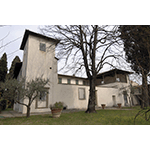Villa Il Gioiello
The villa, the origin of which seems to date to the 14th century, was rebuilt in the 16th century. The name "Gioiello" (Jewel) indicated the favourable location of the property, situated westwards in the hills of Arcetri. In remembrance of Galileo Galilei who here lived the last years of his life, the facade conserves a bust from 1843 and two plaques (1788 and 1942).
It was Galileo’s daughter, Virginia, who informed her father in August 1631 of the possibility to rent the villa adjoining the monastery of San Matteo in Arcetri (both of Galileo’s daughters had become nuns in this monastery: Virginia in October 1616 with the name of Suor Maria Celeste, and Livia in October 1617 with that of Suor Arcangela). Galileo stipulated the lease contract in September 1631. As his biographer Niccolò Gherardini narrates, Galileo «would spend many continuous hours in his garden, tending with his own hands all the pergolas and rows of grapevines, with such symmetry and proportion that it was a worthy thing to see».
After being condemned by the Tribunal of the Holy Office, Galileo was the guest of Archbishop Ascanio Piccolomini in Siena, as it was unwise to proceed to Florence, stricken by the plague. On December 1, 1633, the Congregation of the Holy Office permitted the scientist to return to "Gioiello", but he was forbidden to receive guests to discuss scientific topics with. In the last days of the year, he received the visit of the Grand Duke of Tuscany Ferdinando II de’ Medici. Only in January 1639, given his precarious health conditions, was he permitted to host the young Vincenzo Viviani who, three months before the death of the Pisan scientist, was joined by Evangelista Torricelli.
Here Galileo ended his days, assisted by his son Vincenzo, Torricelli and Viviani. In his Racconto Istorico della Vita del Sig.r Galileo Galilei, Viviani describes the maestro’s final moments: «With the supervention of a very slow fever and palpitations of the heart, after two months of an illness that little by little consumed his spirits, on Wednesday, January 8, 1641 ab Incarnatione [1642], at four in the morning, and at the age of seventy-seven years, ten months and twenty days, with philosophical and Christian constancy, he gave up the soul to the Creator, sending it, as much as faith agrees, to enjoy and more closely admire the eternal and immutable wonders that fragile artifice, great thirst and impatience had permitted the eyes of we mortals to approach».
****************************
Texts by Graziano Magrini
English translation by Victor Beard
Last update 01/dic/2010




